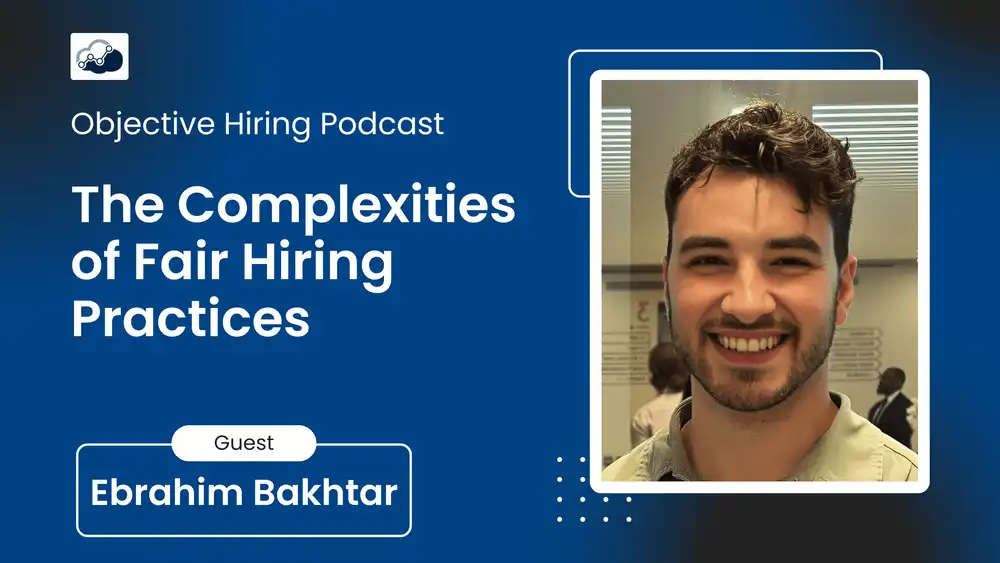Ebrahim Bakhtar on Fair Hiring, Bias, and the Messy Reality of Candidate Evaluation

Can we ever really make hiring fair?
In this episode of the Objective Hiring podcast, Tim Freestone sits down with Ebrahim Bakhtar, Marketing Analytics Expert at PMG, to discuss the uncomfortable truths about hiring decisions—and why bias is almost impossible to remove completely.
“I like science. If someone’s got a biomedical background, I’ll be excited—and that’s a bias. It might not be the best candidate.”
This self-awareness sets the tone for the discussion: hiring is full of grey areas, and even structured processes are subject to human interpretation.
The Illusion of Objectivity
PMG’s hiring process does involve rubrics, notes, and consistency across interviews—but it’s not purely quantitative.
“We don’t give a quantitative score... but there’s a good/bad feeling off the back of each section.”
Even with frameworks in place, interviews are filtered through different cultural lenses, lived experiences, and assumptions. The result? No matter how well-structured the process, human interpretation always plays a part.
Diversity as a Defence Mechanism
Ebrahim’s solution isn’t to eliminate subjectivity—it’s to diversify who holds it.
“The best solution I’ve come up with is to make the hiring team as diverse as possible.”
Sex, gender, race, socio-economic background—all these influence how we perceive candidates. Ebrahim consciously brings in junior team members from varied backgrounds to help avoid single-lens decision-making.
“Healthy disagreements in the hiring team are important.”
It’s a reminder that hiring isn’t about unanimity—it’s about perspective. Diverse viewpoints don’t slow the process; they make it more robust.
Red Flags Aren’t Always in the Resume
One story stood out. A graduate candidate, otherwise fine on paper, noticeably behaved differently with men and women during an interview day.
“Didn’t shake hands with any of the women. Just walked out.”
This wasn’t captured in any scoring rubric. It wasn’t part of a formal test. But it was a huge signal—and only spotted because of who was in the room.
When the Interview Isn’t Over
Ebrahim views the hiring process as ongoing, well into the candidate’s first few months.
“It takes a long time to get to know who someone really is.”
Early indicators—like a lack of feedback from peers, or candidates failing to take initiative—are signs that things may be off-track. The goal is not to wait until it’s too late.
“If you’re not hearing anything positive... ask why.”
Great Hires Make Themselves Known
One of the clearest patterns Ebrahim has observed? Exceptional hires don’t just do the job—they generate unsolicited praise.
“Every account they went on, we got messages. ‘James is amazing. Lawrence is amazing.’ No one asked for that feedback—it just came.”
This offers a practical insight for any hiring manager: great talent creates its own signal. You just have to listen for it.
Why We Still Need Structure
Despite acknowledging the messiness, Ebrahim is clear that structure still matters. Consistent topics. Clear expectations. Agreed evaluation criteria. These are essential—even if they’re interpreted subjectively.
And that’s where tools like Alooba can help. While you can’t fully eliminate bias, you can anchor parts of your process in objective skills data. Combine that with a diverse panel, and you have a much better shot at fairness.
“You can’t predict success perfectly. But you can reduce your margin of error.”
A More Realistic View of Fairness
Ebrahim’s take is refreshingly honest. Instead of striving for perfect fairness, strive for transparency, reflection, and balance.
“You try your best to be aware of your biases. But realistically, you can’t get rid of them.”
If your hiring process feels too clean, too rigid, too perfect—it probably isn’t. Good hiring involves listening, adapting, and staying open to the idea that your first instincts might be wrong.
And that’s okay.
Another key element that Ebrahim reflects on is the tension between moving fast and staying fair. He contrasts his best-ever hiring experience—where PMG's process moved rapidly and involved multiple senior leaders—with slower, more bureaucratic hiring systems that risk losing great talent.
“There’s a massive opportunity cost to hiring too slowly.”
For roles in high-demand fields like analytics, companies often find themselves competing for the same small group of candidates. If your process is delayed by weeks of internal coordination, you could lose top talent not because of a poor fit, but because another employer acted faster.
This is especially important at the graduate level. As Ebrahim notes, grad job hunts are often the hardest of all—candidates don’t yet know their own strengths, and their CVs look more or less the same.
“The hardest job hunt of your life is that first step into your career.”
That’s why PMG's method of looking for aspiration and curiosity—rather than experience alone—is so valuable. The episode reminds hiring managers that great talent doesn’t always present itself in obvious ways. Sometimes, you have to dig.
And that’s a mindset shift more hiring teams should embrace.